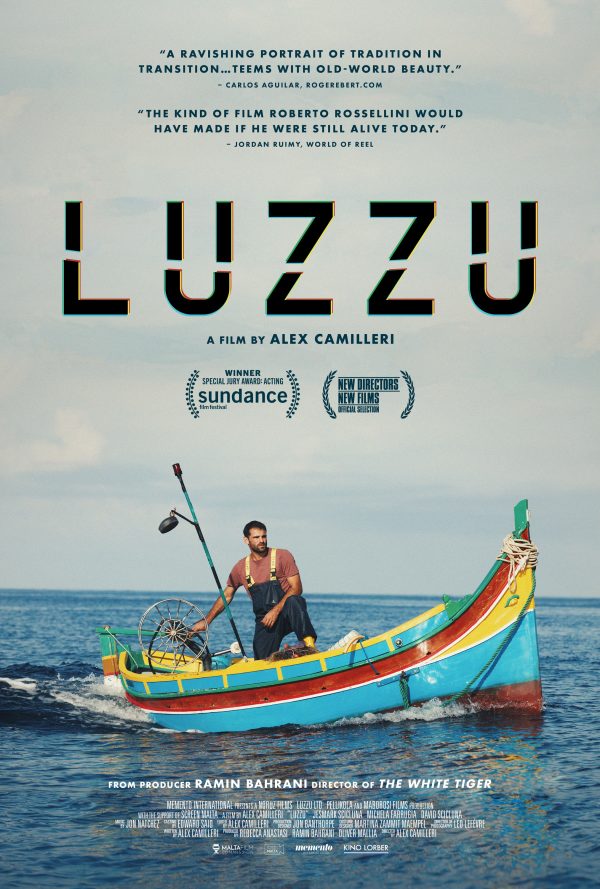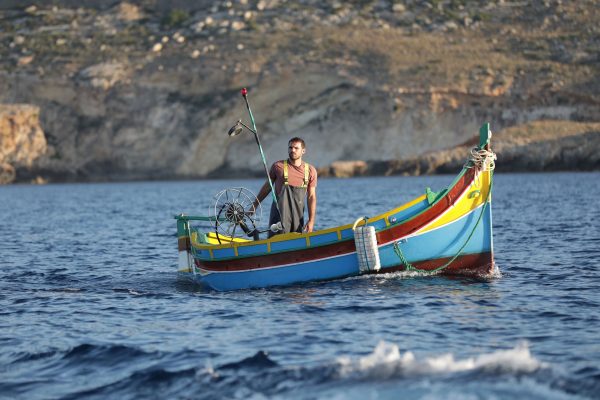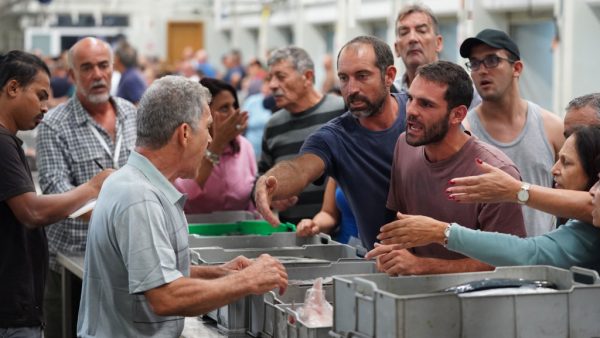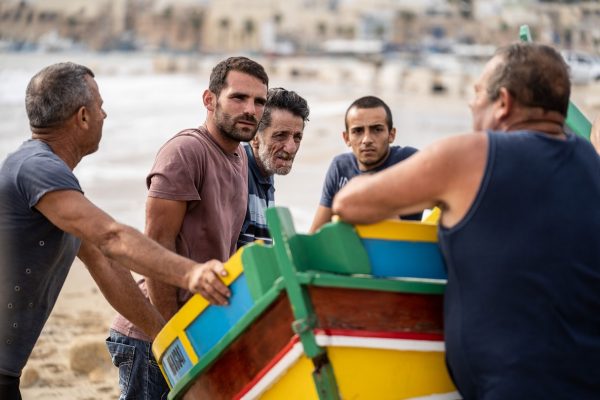
“Luzzu” (2021). Cast: Jesmark Scicluna, Michela Farrugia, David Scicluna, Frida Cauchi, Timur Ali, Uday McLean, Stephen Buhagiar, Marcella Theuman, Yuric Allison, Reece Vella, Simon Falzon, Marta Vella, Anthony Ellul, Michael Sciortino. Director: Alex Camilleri. Screenplay: Alex Camilleri. Web site. Trailer.
Challenging times call for creative solutions. But, when the circumstances are especially dicey, what are we to do? Where do look for the inspiration to devise inventive answers to our problems? We may think that we don’t have any viable options open to us, but they’re there if we know where – and how – to look. Such are the challenges posed to the protagonist of the thought-provoking Maltese drama, “Luzzu.”
As time marches on, things invariably change. That’s particularly true when tradition clashes with progress. Which force will win out? For Maltese fisherman Jesmark (Jesmark Scicluna), that’s a question that has taken on tremendous significance in his life. Jesmark spends his days pursuing the maritime fruits of the Mediterranean in his luzzu, a traditional, brightly painted wooden fishing boat that has been in his family for generations. Fishing with these boats has been a time-honored tradition in the waters off Malta, but it’s always been a hard way of making a living. And, given the changes that have been occurring in the island nation’s fishing industry since Malta became part of the European Union, it’s been getting harder and harder all the time. New supranational ecological regulations and the emergence of advanced fishing techniques, such as the deployment of enormous trawlers by major corporations, have changed the game considerably, marginalizing many independent anglers and forcing many of them out of business or into accepting EU-sponsored buyouts.
Jesmark is by no means immune from these conditions, either. He painstakingly toils to obtain his daily catch, which often yields minimal results, both in terms of the number of fish he reels in and the amount of money he earns at the market auctions, proceedings that often seem rigged in favor of a select few operators. And, on top of that, he’s now developed a serious leak in his boat, forcing him off the waters until he and his friend, David (David Scicluna), can make necessary repairs.
This is all coming at a bad time, too, given what’s going on in his home life. Given the paltry income that fishing is generating these days, Jesmark’s wife, Denise (Michela Farrugia), has had to take a job to help make ends meet. They need the funds to maintain the household and to pay the medical bills for their newborn son, Aiden (Timur Ali), who, according to his pediatrician (Marcella Theuman), requires special care to stimulate his underdeveloped growth. These conditions have consequently begun to strain their relationship, a circumstance made worse by Jesmark’s mother-in-law, Carmen (Frida Cauchi), who has never liked him and often made it plainly clear that Denise could have done better than him.

In an effort to help out financially while his luzzu is in dry dock, Jesmark pursues alternate sources of income, some questionable (such as fencing stolen petrol to drivers looking to stretch their gas money), some legitimate (such as joining David on his fishing boat to help him with his daily catch). As was often the case when Jesmark was marketing his own wares at auction, he witnesses David getting shafted on payment for his catch. But, this time, Jesmark also discovers that the auctioneers are engaging in some behind-the-scenes black market dealings. The auction boss (Stephen Buhagiar) and his right-hand man, Uday (Uday McLean), try leaning on Jesmark to ensure his silence, but he uses his knowledge of their shady practices as leverage to secure a job with his onetime opponents.
This development helps generate the funds he needs, but he’s increasingly asked to do things that grow progressively more dubious. It pains him as he wrestles with his conscience, the effects of which not only impact his vocational pursuits, but also spill over into his increasingly troubled personal life. At the same time, when he considers what he’s earning now compared to what he was clearing as a luzzu fisherman, he begins having doubts about whether or not he wants to return to that way of life, even as repairs on the boat proceed. Those doubts are further stoked when he runs into his old friend, Kevin (Yuric Allison), a onetime fisherman who accepted an EU buyout and now appears to be living more comfortably than when he was working the sea.
In short order, Jesmark is faced with some important decisions. Does he return to his former way of life, or does he stay the course with his new “colleagues”? Is his marriage on solid ground, or is a parting of the ways in the works? Indeed, will tradition manage to prevail, or will it surrender to the path of progress? A lot is obviously on the line. How will it all shake out?
For his part, Jesmark has some difficult choices ahead of him. But what should he do? Well, that depends on what he believes, for his thoughts, beliefs and intents will determine how events unfold thanks to the conscious creation process, the philosophy that maintains these resources shape the reality we experience. And his existence going forward could assume many forms depending on the choices he makes and the beliefs that underlie them.

The various choices Jesmark has available to him cover a wide range of areas. For example, should he continue to stay the course with his traditional form of fishing, or should he pursue something more contemporary, such as taking a job on a trawler or working with the auctioneer? This choice, in turn, is governed by a number of other considerations. For instance, fishing with his one-man luzzu is a time-honored tradition that has been in his family for generations, and it’s a way of life he honestly enjoys, one that even Denise is willing to make sacrifices for in order to indulge his passion. However, the meager catches he draws from this venture yield little money, income that’s probably lower than what he deserves to get given the rigging of the auction system. He could counter that issue by taking the EU-sponsored buyout and securing a more conventional job working for someone else, even if it means giving up a cherished way of life and subverting his passions in the process. Such decisions generally don’t come easily.
In light of Jesmark’s circumstances, the choices he makes carry implications that extend beyond his vocational pursuits. Given Aiden’s condition, for example, he needs to generate enough income to pay for his medical treatments. Can he realistically afford them if he insists on continuing to follow a traditional path, or must he sacrifice that for the welfare of his son? Likewise, considering the adjustments Denise has made to keep the household afloat, shouldn’t Jesmark make comparable alterations in his work routine to assist his wife in her efforts to keep things on an even keel? And what fallout awaits him – and their marriage – if he doesn’t?
Clearly there’s a lot on the line in connection with these choices. Thus it behooves Jesmark to choose wisely, and that’s where a deliberate assessment of his beliefs comes into play. In particular, he needs to examine the beliefs at his core, those associated with his authentic self. Would he realistically cling to selfish beliefs that could potentially ruin his finances and family life? Or is he willing to make choices that allow him to do right by Aiden, Denise and his bank account, even if it means choosing to do something he finds less satisfying than what he has done traditionally? That decision is further complicated by the nature of some of the things he’s asked to do once he begins working for the auctioneer. Can he indeed live with himself if it means compromising his ethics and values just to make a better buck (or, in his case, a better euro)?

Again, these are not easy decisions given all of the ramifications involved. This is very much a case of having to weigh the aforementioned dilemma of tradition versus progress. It can be difficult to let go of what we love in order to do what we know is a higher priority. This has to be painful in some respects, but it also calls for taking into account what’s essential under prevailing conditions. It would be unconscionable to tell Denise that their child must go without medical care just so Jesmark can continue pursuing a vocation that gives him pleasure. At the same time, though, he must also weigh the fulfillment of this need against his conscience and what he’s being asked to do to carry out his parental obligation.
Arriving at a workable solution calls for getting creative, thinking inventively to come up with an answer that addresses all of the relevant considerations involved here. This is one of the chief aims of effective conscious creation. When we realize that all manifestation possibilities are available to us at any given moment, such awareness often opens the door to devising solutions we may not have previously envisioned. This not only helps us out of jams like this, but it also provides us with an important transferable materialization skill that we can employ in other comparably challenging situations. That’s quite a metaphysical bargain.
This scenario also draws attention to another key manifestation consideration – that everything is in a constant state of becoming. This inherently evolutionary principle ultimately comes into play in everything we experience. It provides the basis, for example, of the question of tradition versus progress. This doesn’t necessarily mean that one force will always win out over the other, but changes of some sort will always result in circumstances like these. Indeed, everything is in a constant state of becoming.
All of the foregoing concepts permeate the narrative of this morality play. They combine to provide a framework that all of us may have to face at some point in our lives – the resolution of hard choices. When confronted by such conditions, we may find the circumstances to be difficult, challenging and perhaps even cruelly unfair. Nevertheless, they also help us to expand our horizons and enlighten us in unimagined ways, enabling us to become more innovative and resourceful creators in our own right. And who would have thought something as valuable as that could come out of determining ways to catch a few fish?

While the narrative of this engaging Maltese offering may seem somewhat familiar (at least superficially), there are plot developments that defy formula and take the film in unexpected directions. Add to that the picture’s fresh locale and little-known subject matter, and you’ve got a truly intriguing release. But what’s perhaps most impressive about this debut feature from director Alex Camilleri, a nominee for the Independent Spirit Awards’ Someone to Watch Award, is the strength of the performances he’s managed to evoke from a cast consisting of many nonprofessional actors, including protagonist Jesmark Scicluna, winner of the 2021 Sundance Film Festival Special Jury Award for Acting in the Dramatic World Cinema competition. In dealing with powerful universal themes like tradition versus progress, weighing the expediency of need fulfillment against the preservation of moral values, and knowing when to hold on or let go, all as seen through the lens of the Maltese fishing industry and the struggles of a young married couple trying to manage the challenges of being new parents, the film paints a captivating picture on a variety of fronts, one that never becomes muddled and manages to succeed at wrapping up all of its various story threads by movie’s end. “Luzzu” has thus far largely flown under the radar, playing primarily at film festivals and in limited theatrical release. However, as one of the better films in an otherwise-disappointing year at the movies, this is definitely worth your time now that it’s available for streaming. Indeed, this is one fish story you won’t want to miss.
The act of fishing in this story is not only literal, but also suitably metaphorical. Dilemmas like those Jesmark faces push us to stretch our problem-solving abilities, to become innately more creative in the ways we address the challenges before us. This means plumbing the depths of our consciousness, much in the same way that a fisherman plumbs the depth of the seas to find his or her catch. Great rewards often await us in those murky depths, even if we don’t recognize them until we latch on to what’s below. The outcomes often prove eminently suitable, if not pleasantly delightful. But we’ll never know until we drop our lines in the water and see what we come up with.
Copyright © 2021-2022, by Brent Marchant. All rights reserved.

No comments:
Post a Comment